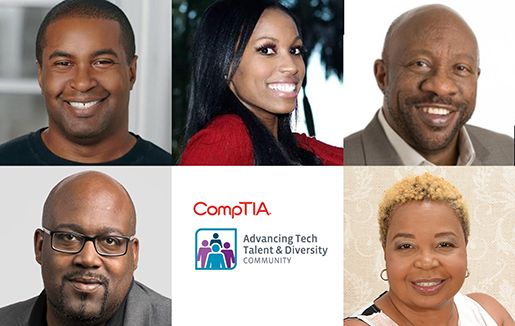 Studies show that companies that prioritize more diverse and inclusive workforces elevate the effectiveness of their businesses, the satisfaction of employees and their overall success. It’s a foundation that CompTIA’s Advancing Tech Talent and Diversity community strives to teach.
Studies show that companies that prioritize more diverse and inclusive workforces elevate the effectiveness of their businesses, the satisfaction of employees and their overall success. It’s a foundation that CompTIA’s Advancing Tech Talent and Diversity community strives to teach.
But for many individuals of color, achieving success in the tech industry began with help from elsewhere first—words of wisdom and guidance passed down from parents to children, professors to students, bosses to underlings. Indeed, mentorship has been an important ingredient to the success of many minority CompTIA members.
We asked several African American members to speak about their mentorship experiences—who was important to them as they started their tech careers, and why it’s important to inspire the next generation into the tech workforce.
Here’s what they had to say:
Aaron Woods
Customer success executive at CEX Services, Portland, Ore.
My original entry in Information Technology was attending an eight-week weekend class on programming at Illinois Institute of Technology (Illinois Tech) during my junior year of high school. I heard about this training through my godbrother, who I consider my mentor. He encouraged me to attend the training and then consider a career in the computer industry, which was mostly software-related at that time. I did not immediately after high school take this route but did return to pursue a career in hardware service when I entered the military. We’ve kept in touch over the years and he always asked how my career in the ‘computer industry’ was going.
I’ve always had a desire to see more young African Americans, Latinos and other people of color have an IT career. My commitment comes from knowing how difficult it was for me to gain entry into the field. I speak at forums that support getting young people of color into IT careers. While there are many resources available today that make this task easier, getting on the right path is not always clear. The objective of my mentorship is to provide direct information to help young people looking at a career in IT know where to get started. The resources provided by CompTIA makes this easier. I point them to the CompTIA Core Certifications Pathway as a foundational start in an IT career.
Eric Pinto
Senior director, channel, at SocSoter
OK Boomer… I think a lot about that meme from last year. Designed to poke casual fun at a generation that didn’t grow up in the age of technology and therefore deemed out of touch by millennials. I often think of the very different set of challenges presented to the African American generation before me and the deepening disconnect with those that have followed since.
Culturally, it was the baby boomers who carved a path for me. My parents (both born in early 1950’s New York City) understood an America that was very different from today. An America shackled in the still too recent memory of an oppressive history and divided reality.
For my generation, technology is the great equalizer. My father knew this early on. I’m not sure he was aware of depth or gravity of the digital divide back in 1985, but he knew enough to know that the emerging world was less concerned with skin color than a person’s capability. He pushed me to ask questions and to understand the value of technology in the changing economy.
Tech has always been the great equalizer…. Thankfully, my father knew this way before I did. I am grateful that he was kind enough to impart a fraction of his wisdom with me. I can only hope to do the same for my own son as he navigates the next chapters in African American culture and technology.
Colleen Payne
President, Universal Adaptive Consulting Services, Henrico, Va.
I had several professionals that gave me advice along my Journey to becoming an owner of UACS a full-service information technology service provider. We currently mentor high school, college students as well as provide internships for the students. Moreover, we patriciate in mock interviews and resume preparation for our students as well. In addition to the Internships, we donate $1,000 a year for the students for their college education.
Giving back to our youth is apart what we are about here at UACS. We are very passionate about the success of our youth and all we ask of the students is to pay it forward. I found the mentoring was beneficial. I had mentors from the financal accounting end to the technology side. These mentors made a difference in my knowledge base as well had an open door policy for questions to be asked.
Eric Powell
Founder of Rylet Industries, San Antonio
One of my mentors that helped me to transition into the IT industry is Corey Kirkendoll at 5K Technologies. Corey, another black male, essentially took me under his wing and showed me the ropes of becoming an IT professional. His guidance has been invaluable.
Interestingly enough, The US Bureau of Labor Statistics has shown that black male unemployment is higher when compared to other demographics. In addition, the IT industry has projected millions of positions will go unfilled within the next decade. So, why is this important to discuss during Black History Month? Well, many people don’t know this, but one of Dr King’s strategic goals was to address economic injustices among America’s disenfranchised.
Hence, the IT industry is in a unique position to address historical economic injustices by reaching out to qualified individuals that may not be exposed to careers in information technology. One way we can address these goals is to expose other young black men, like myself, to careers in information technology, cybersecurity, and everything in between.
Crystal Wharton
Talent acquisition partner at Tech Data, Clearwater, Fla.
I did not have a mentor when I first started in the IT industry. At first, I considered this to be a setback for my career, because I noticed that all of the successful people around me had mentors, and support to help guide them through the corporate politics and ladders. I started studying successful people that I wanted to be like, and started to emulate them, and they served as my un-official mentors until I got to a place where I no longer needed to be like them. Four years in, I found a flow that works for me, and I’m happy to say that I was able to develop that style on my own. I now have a mentor, who is not in the IT industry, but is still able to provide valuable insight, advice, and support.
I currently lead a Women’s Empowerment support group for a diverse group of eight women who are in the IT industry at Tech Data. We meet twice a month and discuss topics that are relevant for young diverse women navigating in the IT industry to experience. It’s so important and gratifying for me to give back to young girls who don’t have anybody to look up to, because I didn’t have that. And I’ve learned overtime, that YOU need to stand in to fill the gap if you ever expect change to occur, and I live that out each day!
Click here to learn more about CompTIA’s Advancing Diversity in Technology Community and join today. And for more information, download CompTIA’s newly published Diversity and Inclusion (D&I) Plan for Technology SMBs guide, which spells out strategies to help companies achieve inclusion objectives.

 Add CompTIA to your favorite RSS reader
Add CompTIA to your favorite RSS reader

